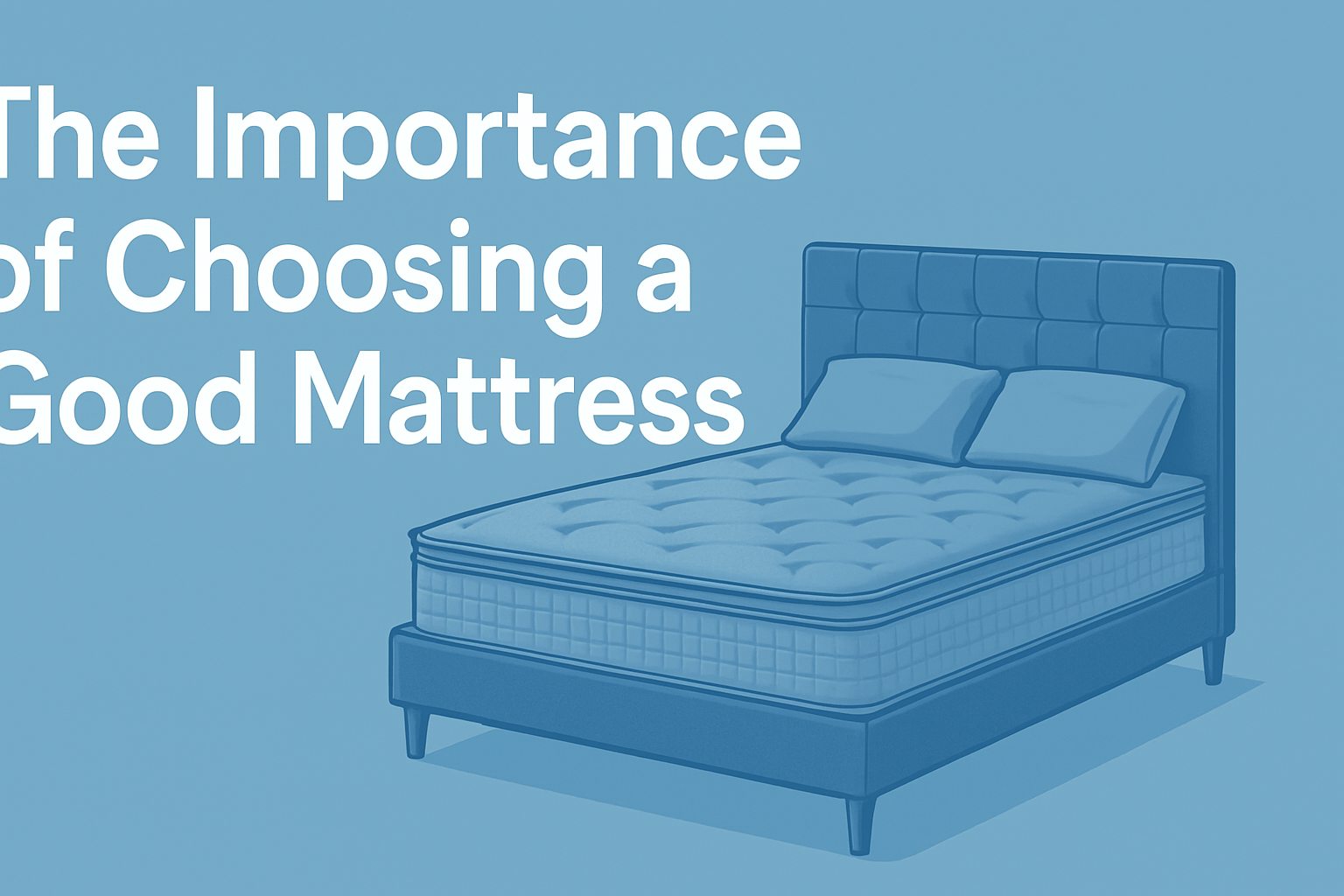💤 The Importance of Choosing a Good Mattress: A Guide for UK Sleepers
Let’s talk about something that doesn’t get nearly enough attention: your mattress.
We change our pillows, swap out bed sheets, and even upgrade our duvets with the seasons—but when’s the last time you really thought about what you’re sleeping on every single night?
If you’re waking up groggy, stiff, or feeling like you didn’t sleep at all, chances are the problem isn’t the weather, your work stress, or the neighbour’s cat meowing at 3 a.m. It might just be your mattress.
So, in this post, we’ll explore:
-
Why your mattress is crucial for good sleep
-
How the right mattress supports your health and wellbeing
-
What to look for when choosing one
-
Advice for mattress sizes and types
-
Common mistakes to avoid
🛏️ Why Your Mattress Matters More Than You Think
We spend about a third of our lives sleeping. That’s nearly 25 years lying on a mattress! So, it’s a little ironic that most of us don’t give this vital piece of furniture the attention it deserves.
Here’s why it’s more important than you think:
1. Your Mattress Affects Your Sleep Quality
A mattress that’s too soft, too firm, or simply worn out can prevent your body from entering deep, restorative sleep. Instead of relaxing into a restful slumber, you’re tossing and turning, trying to get comfortable.
Sleep studies show that a supportive mattress can significantly improve sleep duration and quality, especially for people who suffer from back pain or joint issues.
2. It Impacts Your Physical Health
A poor mattress can lead to:
-
Back, neck, and joint pain
-
Poor spinal alignment
-
Worsened posture
-
Increased stress and fatigue
The NHS recommends replacing your mattress every 7–10 years to ensure it continues to provide proper support.
3. Mental Health Benefits
Did you know that bad sleep is strongly linked to anxiety, depression, and poor concentration?
A comfortable, well-chosen mattress supports more than your body—it supports your mind. Sleep is when your brain resets. Without it, you’re groggy, irritable, and far less resilient.
🔍 How to Know If Your Mattress Needs Replacing
If you’re not sure whether it’s time for a new mattress, ask yourself:
-
Do you wake up with aches and pains?
-
Is the mattress sagging or lumpy?
-
Do you sleep better in hotels or on someone else’s bed?
-
Is it more than 8 years old?
-
Do you or your partner frequently wake each other up due to movement?
If you answered yes to two or more, your mattress might be the culprit.
Mattress Buying in the UK: What Makes a “Good” Mattress?
Let’s break down the features that define a good mattress in the UK market.
1. Support
Support means how well the mattress keeps your spine in a neutral alignment. If your back bows or hips sink too deep, it’s a red flag.
Generally:
-
Side sleepers need softer support at pressure points like shoulders and hips.
-
Back and front sleepers do better with firmer mattresses to keep the spine aligned.
2. Firmness
Firmness is often ranked from soft to extra firm. But here’s the trick—firmness is subjective.
A 10-stone person and an 18-stone person will experience the same mattress very differently.
General UK firmness guide:
| Sleep Position | Recommended Firmness |
|---|---|
| Side Sleeper | Medium-Soft to Medium |
| Back Sleeper | Medium-Firm |
| Stomach Sleeper | Firm |
3. Material Types
The most common types of mattresses in the UK:
-
Pocket Sprung: Individual springs in fabric pockets. Great for support and reducing movement transfer.
-
Memory Foam: Moulds to your body. Excellent for pressure relief but can trap heat.
-
Hybrid: Combination of foam and springs. Offers the best of both worlds.
-
Latex: Natural and breathable. Resistant to dust mites and very durable.
Each has its pros and cons, and your preference will depend on your body weight, sleeping position, and even the room temperature.
4. Temperature Regulation
If you run hot at night (or live in a converted loft bedroom), opt for mattresses with breathable materials like:
-
Natural fibres (wool, cotton)
-
Gel-infused foams
-
Open coil springs (allow more airflow)
5. Motion Isolation
Couples, this one’s for you.
Ever woken up every time your partner turns over? A mattress with good motion isolation (like memory foam or pocket springs) helps you stay asleep, even if they’re tossing and turning.
6. Allergy Considerations
If you’re prone to hay fever or dust allergies, opt for:
-
Hypoallergenic mattresses
-
Washable mattress protectors
-
Anti-dust mite treatments
Some mattresses in the UK are even approved by the British Allergy Foundation.
🧠 What Happens When You Don’t Prioritise Your Mattress?
Let’s be honest—we’ve all made do with a saggy mattress for a few years too long. But what are the consequences?
-
You never feel fully rested, even after 8 hours.
-
You develop chronic back or hip pain.
-
You become more reliant on caffeine or painkillers.
-
You start dreading bedtime (and that’s no way to live).
A mattress isn’t a luxury. It’s a health investment.
💷 Budgeting for a Mattress in the UK
So, how much should you spend?
It’s tempting to go cheap, especially with cost-of-living pressures. But remember, a mattress lasts up to 10 years. If you divide the cost across a decade, it often works out to just 20–30p per night.
That’s a pretty good deal for better health and wellbeing!
General price guide:
| Mattress Tier | Price Range (UK) | Suitability |
|---|---|---|
| Budget | £150–£300 | Spare rooms, kids |
| Mid-range | £400–£800 | Everyday use |
| Premium | £900+ | Luxury feel, long-term investment |
🧾 Tips for Buying the Right Mattress in the UK
Here are some quick UK-specific tips when mattress shopping:
-
Know your bed size: UK bed sizes differ slightly from European or US sizes.
-
UK Double: 135 × 190 cm
-
UK King: 150 × 200 cm
-
UK Super King: 180 × 200 cm
-
-
Check for a fire safety label: All UK mattresses must meet British fire safety regulations. Look for a label confirming BS 7177 compliance.
-
Delivery and assembly: Bed Kings can remove your old mattress and unpack the new one for you.
-
Don’t forget the base: Slatted bed bases, divans, or ottomans can all affect how a mattress feels. If your base is sagging, a new mattress won’t solve the issue alone.
🧘♀️ Real Benefits of a Good Mattress
Let’s wrap this up with a vision of what your life could be like with a supportive, comfortable mattress:
-
You fall asleep faster and wake up less during the night.
-
You wake up with less pain and more energy.
-
You feel calmer, sharper, and more productive.
-
You look forward to bedtime, instead of dreading another poor night’s sleep.
All that from a rectangle of foam and springs? You bet.
🌙 Final Thoughts: Your Bed is Your Recharge Station
Think about all the money we spend on daily comforts—fancy coffee, new tech, gym memberships, streaming services. Yet, we spend a third of our lives in bed… often on a mattress that doesn’t support us properly.
If there’s one place to invest your money wisely, it’s here. A quality mattress supports your spine, improves your sleep, and boosts your mental and physical wellbeing. It’s not a splurge. It’s a foundation for the rest of your life.
So, when’s the last time you showed your bed some love?
Sleep well! 🌙✨



Share:
Choosing the Best Children’s Bed: Fun, Storage & Sleep Quality